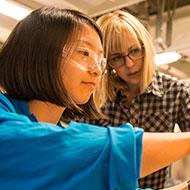The following criteria, excerpted from the Bulletin and the Rules and Regulations of the Faculty, should be considered when evaluating subjects being proposed for Institute Lab credit.
The Institute Laboratory Requirement consists of subjects that require a major commitment of the student’s attention in comprehensive projects rather than stand-alone experiments or exercises. The primary emphasis of an Institute Laboratory subject is to stimulate a student’s resourcefulness, planning skills, and analysis of observations. Institute Laboratory subjects combine ideas, methods and techniques that would be familiar to a professional in the subject’s discipline. While a Laboratory subject may teach specific techniques, the techniques themselves are not the primary emphasis. Under faculty supervision, the student is responsible for planning and designing the experiments or projects, including selecting measurement techniques, executing the plan, analyzing results, and presenting their conclusions. Details of the elements that comprise an Institute Laboratory subject differ between disciplines.
The Laboratory Requirement is met by successfully completing subjects designed and approved for this purpose. Each Institute Laboratory subject provides a designated number of units toward the Laboratory Requirement. Such subjects may be taken in any combination to fulfill the Requirement so long as the student completes 12 units in sum designated as counting towards the Laboratory Requirement. Any units taken as part of these subjects beyond the 12 needed for completion of the Laboratory Requirement will be counted as units beyond the GIRs. At least a portion of the Laboratory Requirement is suggested to be fulfilled in the first two years.3
Laboratory subjects(s) or modules constituting 12 units (in sum) designated for the Laboratory Requirement, such that the Laboratory work will call for a major commitment of the student’s attention; it is suggested that students satisfy at least a portion of the Laboratory Requirement during the first two years.
In reviewing proposals for subjects or modules that count toward satisfying the Laboratory Requirement, the CoC also considers the following:
- Subjects of 9-15 units count as one subject; subjects of at least 6 units but fewer than 9 units count as half-subjects, and subjects of fewer than 6 units are considered modules.
- At least half of the units of the class should focus on the Laboratory. Often times, this will be captured in the middle laboratory/design/fieldwork component of the unit distribution, e.g., the 6 in a 2-6-4 subject. However, a “major commitment of the student’s attention to one or more experimental problems” may also come in the form of time spent in lecture, recitation, readings, or other preparation. The number of units that satisfy the Laboratory Requirement must be identified in the Institute Laboratory units field on the proposal form.
- The proposal must explain how the subject meets the criteria for a Laboratory as described in the Bulletin.
- A subject that provides 12 units of Institute Laboratory credit may not serve as a prerequisite for another Institute Laboratory subject.
During the 2011-12 academic year, the CoC ruled that a subject that provides 12 units of Institute Laboratory credit may not serve as a prerequisite for another Institute Laboratory subject.





